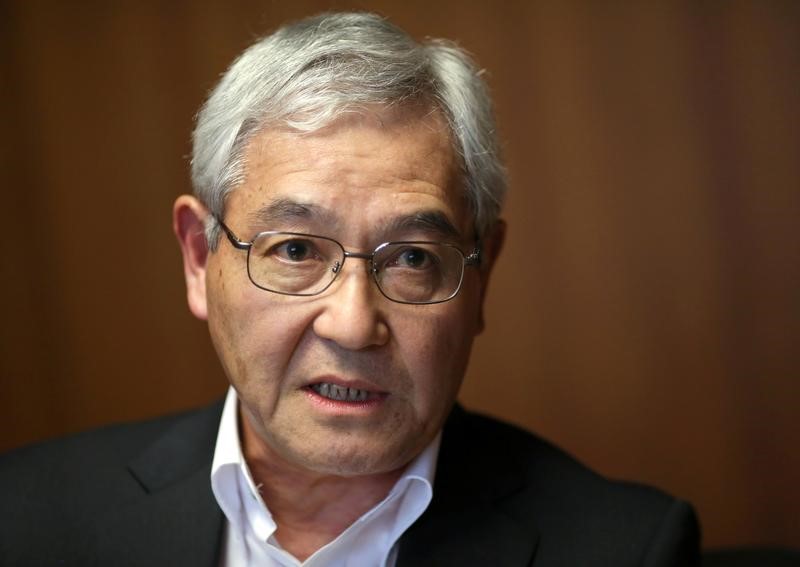 © Reuters. BOJ board member Sakurai speaks during an interview with Reuters at the BOJ headquarters in Tokyo
© Reuters. BOJ board member Sakurai speaks during an interview with Reuters at the BOJ headquarters in TokyoBy Stanley White and Sumio Ito
TOKYO/HAKODATE (Reuters) – Bank of Japan board member Makoto Sakurai on Wednesday dismissed the need for additional monetary easing, saying the central bank should not take unnecessary steps to accelerate the timing of its 2 percent inflation target.
Sakurai’s comments are a sharp contrast to those of another board member at the BOJ’s September meeting, who called for stronger measures to help consumer prices reach the central bank’s 2 percent target.
“There’s no need to do anything excessive to quickly meet the price target,” Sakurai said after meeting business leaders in Hakodate, northern Japan.
“Our current policy with yield curve control is sufficient.”
The BOJ has had to push back the timing for reaching its price target six times since it deployed its massive stimulus program in 2013.
It now hopes consumer inflation will hit the 2 percent target by March 2020, but core consumer prices rose only 0.7 percent year-on-year in August.
Economists have said even this timeframe is unlikely, but the BOJ’s official stance is inflation is set to accelerate.
The BOJ’s policy board next meets on Oct. 30-31, when it will update its consumer price forecasts.
A summary of opinions from the previous meeting in September showed one member, who was not identified, calling for stronger stimulus measures.
While such a proposal is unlikely to win over a majority of the BOJ’s nine board members, it could spur public debate about whether the BOJ’s policies still make sense after repeated revisions to its price target timeframes.
Sakurai reiterated the BOJ’s view that consumer prices remain on track to reach 2 percent because companies will eventually have to pass higher labor costs on to consumers.
Sakurai also said the rising labor participation rate and companies’ efforts to raise productivity are placing downward pressure on wages and prices in the short term.
However, these two developments are beneficial to prices over the long term, because this will lead to faster economic growth, he said.
At its previous meeting, the BOJ kept monetary policy steady by maintaining its short-term interest rate target at minus 0.1 percent and a pledge to guide 10-year government bond yields around zero percent.
The BOJ also buys exchange-traded funds (ETFs) so its holdings increase at a pace of about 6 trillion yen ($53.44 billion) a year.
It is too soon to think about changing the size of these purchases, Sakurai said on Wednesday.
The BOJ’s official stance is its purchases of ETFs help reduce risk premiums, but some analysts say the purchases artificially push up Japan’s stock markets.
Sakurai also said the BOJ should not change its 2 percent inflation target, as such targets were used by other central banks and contributed to stability in foreign exchange rates.
Fusion Media or anyone involved with Fusion Media will not accept any liability for loss or damage as a result of reliance on the information including data, quotes, charts and buy/sell signals contained within this website. Please be fully informed regarding the risks and costs associated with trading the financial markets, it is one of the riskiest investment forms possible.
Source: Investing.com


























